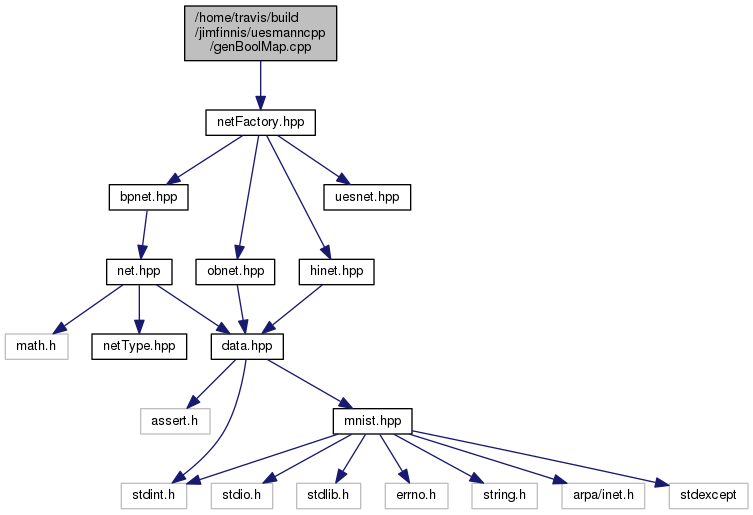|
UESMANN CPP
1.0
Reference implementation of UESMANN
|
|
UESMANN CPP
1.0
Reference implementation of UESMANN
|
Generate a 2D grid (well, a table from which such a grid can be generated) of how many trials of UESMANN on every combination of binary boolean functions succeed. More...
#include "netFactory.hpp"
Go to the source code of this file.
Macros | |
| #define | NUM_ATTEMPTS 1000 |
| How many networks to attempt for each pairing in genBoolMap. More... | |
| #define | ETA 0.1 |
| the learning rate for genBoolMap More... | |
| #define | EPOCHS 75000 |
| how many epochs to train each genBoolMap network for - at 8 examples per epoch, this is 600000 training iterations (single examples) More... | |
Functions | |
| bool | boolFunc (int f, bool a, bool b) |
| given a function index, perform the appropriate boolean. The index is actually the truth table: four bits in order 00,01,10,11 More... | |
| bool | success (int f1, int f2, Net *n) |
| test if a given network successfully performs a given pair of boolean functions, modulating from f1 to f2. The functions are indices into the simpleNames array. More... | |
| double | doPairing (int f1, int f2) |
| Train a large number of networks to do a particular pairing of boolean functions (provided as indices into simpleNames) and return what proportion successfully perform that pairing under modulation. More... | |
| int | main (int argc, char *argv[]) |
| The main function for genBoolMap. More... | |
Variables | |
| double | ins [][2] |
| possible inputs to boolean functions More... | |
| const char * | simpleNames [] |
| names of functions performed by boolFunc() More... | |
Generate a 2D grid (well, a table from which such a grid can be generated) of how many trials of UESMANN on every combination of binary boolean functions succeed.
This should (and does) generate approximately the same data as in Fig. 5.3a of the thesis (p.100). The variation is no greater than 0.001 (i.e. a single network) in each pairing tested.
Definition in file genBoolMap.cpp.
| #define EPOCHS 75000 |
how many epochs to train each genBoolMap network for - at 8 examples per epoch, this is 600000 training iterations (single examples)
Definition at line 26 of file genBoolMap.cpp.
| #define ETA 0.1 |
the learning rate for genBoolMap
Definition at line 19 of file genBoolMap.cpp.
| #define NUM_ATTEMPTS 1000 |
How many networks to attempt for each pairing in genBoolMap.
Definition at line 16 of file genBoolMap.cpp.
| bool boolFunc | ( | int | f, |
| bool | a, | ||
| bool | b | ||
| ) |
given a function index, perform the appropriate boolean. The index is actually the truth table: four bits in order 00,01,10,11
Definition at line 50 of file genBoolMap.cpp.
| double doPairing | ( | int | f1, |
| int | f2 | ||
| ) |
Train a large number of networks to do a particular pairing of boolean functions (provided as indices into simpleNames) and return what proportion successfully perform that pairing under modulation.
Definition at line 110 of file genBoolMap.cpp.
| int main | ( | int | argc, |
| char * | argv[] | ||
| ) |
The main function for genBoolMap.
Definition at line 160 of file genBoolMap.cpp.
| bool success | ( | int | f1, |
| int | f2, | ||
| Net * | n | ||
| ) |
test if a given network successfully performs a given pair of boolean functions, modulating from f1 to f2. The functions are indices into the simpleNames array.
Definition at line 80 of file genBoolMap.cpp.
| double ins[][2] |
possible inputs to boolean functions
Definition at line 32 of file genBoolMap.cpp.
| const char* simpleNames[] |
names of functions performed by boolFunc()
Definition at line 41 of file genBoolMap.cpp.
 1.8.11
1.8.11